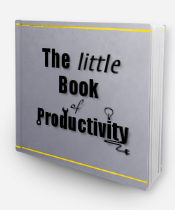
I’ve written a lot of articles about productivity over the last two years. Since I set the goal of making myself more productive several years ago, I’ve read dozens of books and thousands of articles on the topic. If you’re trying to become more productive, it can be a bit daunting to get started. Just on this website, I’d estimate there are about 300 articles aimed at tackling the idea through one perspective or another.
Because of this vast spread of ideas, I’ve written an ebook that combines the most important ideas into one source. The Little Book of Productivity is exactly that, an ebook containing ninety-nine ideas designed to make you more productive. Some of the ideas will be familiar to readers who have read every article I’ve written. Others are completely new, ideas I haven’t had a chance to write into an article.
I don’t usually write lists of tips. Although I love reading a good list of tips, that isn’t my style of writing. As a result, each idea in The Little Book of Productivity, is exactly that: an idea. A mini-article exploring a useful principle of productivity.
The ebook is split into seven chapters, and I’m giving the first one, “Beating Procrastination”, away for free.
The full book has all seven chapters and ninety-nine ideas to make you more productive. You can get the ebook here, for $9.95. As always, I’ve put a 120-day return policy for the book, so there is no risk in giving the ideas a try.
Here’s a taste of the full book, with just one idea from the preview chapter:
Schedule Calibration
Let’s play a trust exercise. You’re going to stand up and then fall backwards. Don’t worry, I’ll catch you.
What? You fell backwards and hit the floor. That must have hurt. It’s not really my fault, see I wrote this months before you’re reading it. And we aren’t even in the same location.
It would be understandable if you didn’t trust me after my little prank. It would be hard to rely on me in the future if you can’t trust me. While it’s easy to understand why a lack of trust damages a relationship, it can be harder to see how a lack of trust keeps you procrastinating.
When you don’t trust your to-do list, it’s easy to procrastinate. When you finish everything on your list, and proceed to add more, that’s violating trust. Before you started working, you had motivated yourself by saying you would be finished when the list was over. Adding more tasks breaks that trust, so you can’t motivate yourself again.
Schedule calibration is when you have full trust in your to-do list. When it says you have a lot of work to do, you get all of it done. When it says you are finished, you stop. By keeping that trust, you avoid bad habits of both overwork and laziness.

 I'm a Wall Street Journal bestselling author, podcast host, computer programmer and an avid reader. Since 2006, I've published weekly essays on this website to help people like you learn and think better. My work has been featured in The New York Times, BBC, TEDx, Pocket, Business Insider and more. I don't promise I have all the answers, just a place to start.
I'm a Wall Street Journal bestselling author, podcast host, computer programmer and an avid reader. Since 2006, I've published weekly essays on this website to help people like you learn and think better. My work has been featured in The New York Times, BBC, TEDx, Pocket, Business Insider and more. I don't promise I have all the answers, just a place to start.